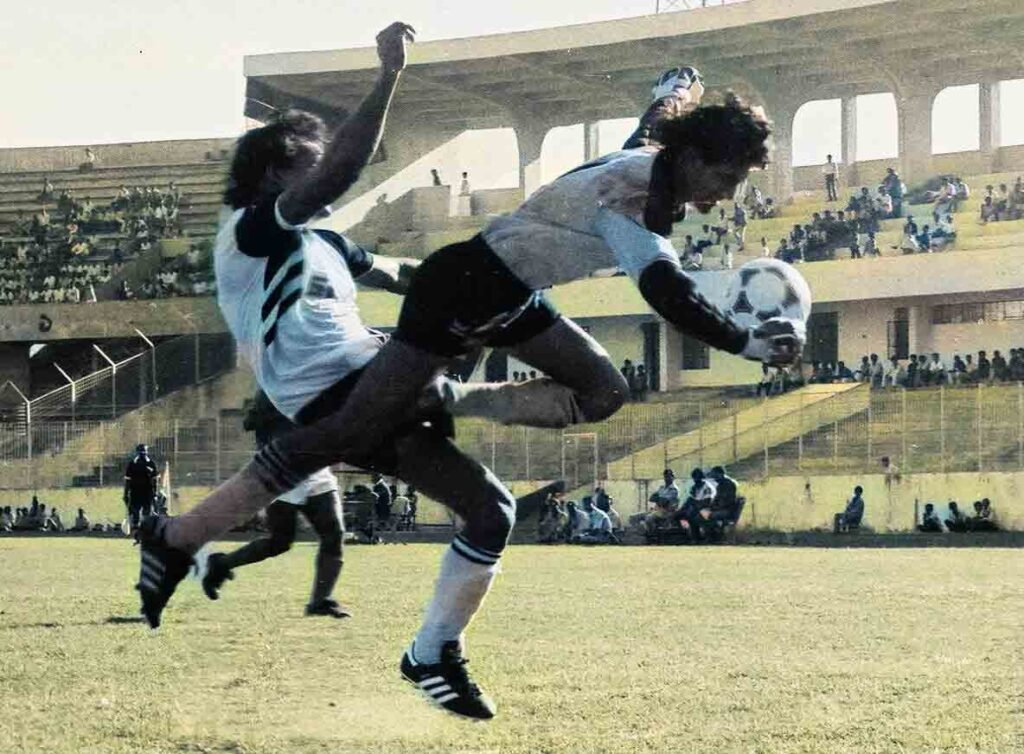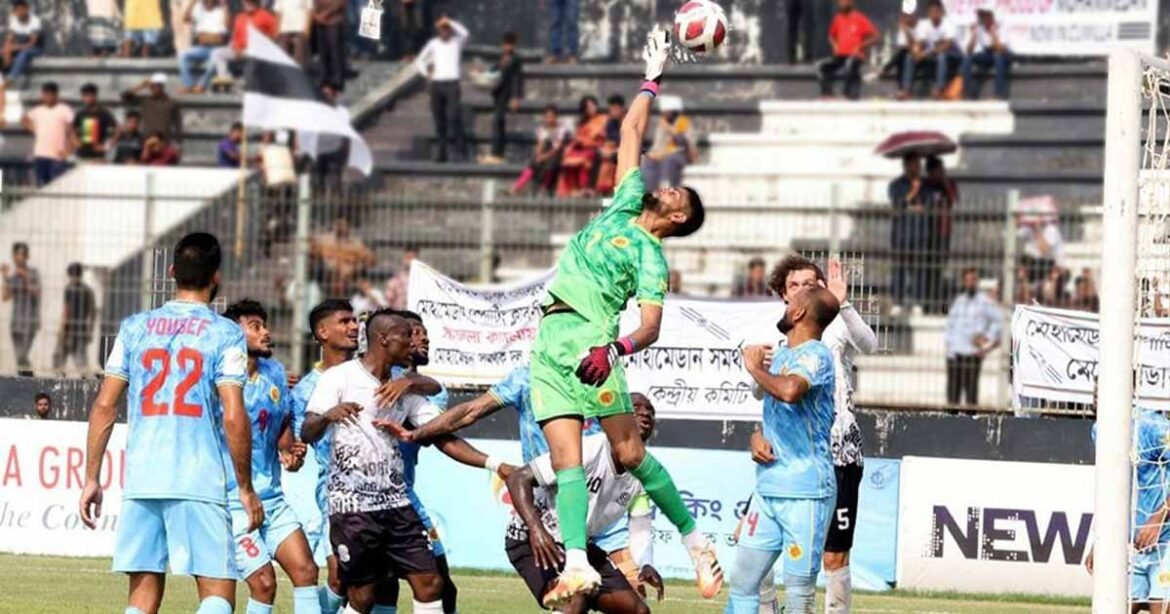Malian forward Souleymane Diabate displayed a remarkable performance, scoring four goals, as Mohammedan Sporting Club secured victory over their arch-rivals Abahani Limited in a thrilling final match of the Federation Cup. The match took place at the Shaheed Direndranath Datta Stadium in Cumilla on Tuesday.
You can also read: Will the world of music change with AI?
In an exhilarating encounter that saw a total of eight goals, Mohammedan Sporting Club emerged triumphant after a nail-biting tie-breaker, with a final score of 4-2. The intense battle extended into extra time, which ended in a 4-4 draw. This victory marked a significant milestone for Mohammedan, as they lifted the Federation Cup trophy after a 14-year hiatus.
The best derby ever?
Mohammedan Sporting Club claimed victory in the Federation Cup final, marking their first title win since 2009 when they also triumphed over the same opponent through a penalty shootout. This victory came after their previous success in the Independence Cup in 2014.
The final match was captivating, filled with dramatic twists and turns. Mohammedan’s substitute goalkeeper, Ahsan Habib Bipu, emerged as the hero of the tie-breaker, saving two crucial penalties. Souleymane Diabate, the standout performer of the match, scored four goals at pivotal moments, finding the back of the net in the 56th, 61st, 83rd, and 107th minutes. His feat made him the first player in the history of the competition’s final to achieve a hat-trick.
Diabate’s exceptional contributions didn’t end there. With a total of eight goals throughout the tournament, he finished as the top scorer and was rightfully awarded the Player of the Final and Player of the Tournament honours. In a post-match interview, Mohammedan’s captain, Diabate, credited the team’s success to their collective spirit and unwavering dedication to the club. He expressed his satisfaction at leading the team to victory, emphasizing the importance of the club’s triumph rather than individual records.
Abahani Limited initially took control of the match, securing a 2-0 lead in the first half. Foysal Ahmed Fahim opened the scoring in the 17th minute, followed by Daniel Colindres doubling the lead in the 43rd minute. However, Mohammedan Sporting Club mounted a strong comeback early in the second half, equalizing the scoreline to 2-2 in the 60th minute. Abahani regained the lead in the 66th minute through a goal from Emeka Ogbugh. Mohammedan refused to be defeated, leveling the score once again at 3-3 by the end of regular time, with Diabate completing his hat-trick.
In extra time, Mohammedan seized the lead with a penalty, only to be denied victory in the dying minutes by Rahamat Mia’s spectacular strike in the 118th minute, making it 4-4. Mohammedan’s regular goalkeeper, Sujon Hossain, sustained an injury while attempting to save a volley in the 111th minute, leading to the entry of substitute goalkeeper Bipu in the 115th minute. Bipu’s heroics proved vital during the penalty shootout, saving spot-kicks from Abahani’s captain Raphael Augusto and Colindres. Emeka Ogbugh and Yousef Mohammad successfully converted their penalties for Abahani, but it was not enough to secure victory.
The final clash between Mohammedan Sporting Club and Abahani Limited will be remembered as an enthralling encounter, showcasing the resilience and determination of both teams. However, Mohammedan Sporting Club emerged victorious, ending their 14-year wait for the Federation Cup title.
With this victory, Mohammedan Sporting Club secured their 12th title in the Federation Cup, while their opponents Abahani Limited, who had previously won four Federation Cup titles in the past six seasons, ended the season without any silverware for the second time since the rise of Bashundhara Kings in the 2018-19 season.

Abahani-Mohammedan: A nostalgic journey into Bangladesh football’s Rivalry
The recent final between Abahani and Mohammedan in Cumilla showcased one of the most captivating and entertaining matches in the history of domestic football in Bangladesh.
Just like in any major football-loving city around the world, Dhaka, the capital of Bangladesh, had its own historic club rivalry between Abahani and Mohammedan that was once brimming with passion and excitement. The Dhaka Derby, as it came to be known, evoked immense fervour among football fans in the ’80s and ’90s. It held a special place in the hearts and minds of football aficionados, and the anticipation for a Dhaka Derby would build up for weeks or even months.
As television became more accessible, the Dhaka Derby took on a more tangible form for those like me, who were unable to witness the matches in person due to the perceived rowdiness of the stadium. The names of players like Salam, Aslam, Badal, Chunnu, Gaffar, Iliyas, Mohsin, Kanon, Munna, Sabbir, and many others became synonymous with heroism or rivalry, depending on which side of the Abahani-Mohammedan divide one belonged to.
Bangladesh Television played a significant role in bringing the excitement of football to our screens. From highlight shows like “Road to Wembley,” featuring the FA Cup, to Serie A coverage showcasing the best matches of the week (with the Italian league reigning supreme at that time), football enthusiasts were treated to a range of wonderful content. Yet, the Dhaka Derby continued to cast its spell on the audience throughout the ’80s and a major part of the ’90s.
After the matches, we eagerly awaited the return of the elders from the stadium, hoping to hear captivating anecdotes about the game, the atmosphere, and even humorous incidents such as an Abahani fan mistakenly finding themselves in the Mohammedan stand.
However, gradually and unknowingly, the domestic game began to lose its appeal, and the significance of the Dhaka Derby started to fade away from people’s minds and news coverage. The once-thriving rivalry became a nostalgic memory for those who had experienced the golden era of domestic football in Dhaka.
Despite the waning prominence of the Dhaka Derby, its legacy remains ingrained in the hearts of football fans who recall the passion, excitement, and unforgettable moments that made it such a cherished part of Bangladeshi football history.


